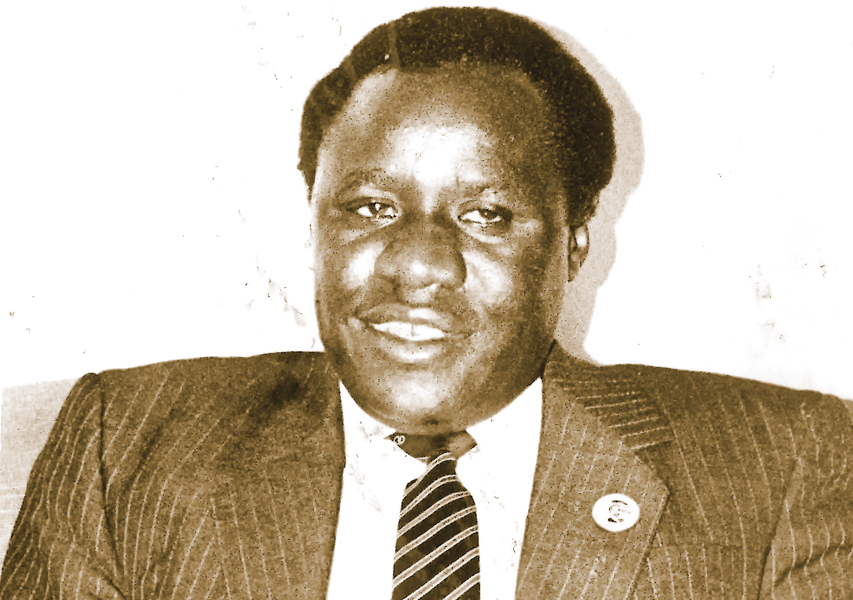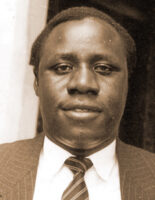
The 29 January 1988 issue of The Weekly Review news magazine carried on its cover a portrait of Henry Kosgey, the Minister for Culture and Social Services, bearing the headline ‘Man in Trouble’. Inside, the article stated that the KANU Nandi District powerbrokers at that time, Mark arap Too and Ezekiel Bargetuny, had decided that Kosgey must lose his Tinderet parliamentary seat. No reason was given for the fallout.
At the time, Kosgey was smarting from accusations that he had dipped his fingers into the All Africa Games till. Later, it emerged that the two key allies of President Daniel arap Moi had claimed that Kosgey had failed to utilise his position in the Cabinet and as the KANU Nandi chairman – the most senior politician in the area – to benefit the community.
To replace Kosgey for the Tinderet parliamentary seat was Kimaiyo arap Sego, a young, unassuming Kapsabet-based lawyer who had unsuccessfully campaigned against the minister in 1983. And with that began Sego’s short-lived fairy tale – because the powerbrokers also fell out with the newcomer and were soon plotting a Kosgey comeback.
The Weekly Review of April 1989 titled his exit ‘A rapid rise, a precipitous fall’ and described it thus: “The (MP) for Tinderet in Nandi District, Mr Kimaiyo arap Sego, who was the Minister for Commerce until his dismissal from the post by President Daniel arap Moi in mid-January this year, would probably curse the day when he decided to leave his legal practice… to enter the volatile field of politics. The troubles that have dogged his nascent political career ever since he fell out (with those who sponsored him) have been growing by leaps and bounds.”
Sego was born in September 1952 in a place called Kaptendon in Lessos Location, Nandi District (now known as Nandi County), to Sylvester and Felister Sego. The elder Sego served with the Kings African Rifles (KAR) during the Second World War and later retired to farming.
The former MP attended Kalibwani Primary School before moving on to the then prestigious Kapsabet High School for his Ordinary Level education and then St Mary’s Yala to do his Advanced Level. He would later join the University of Nairobi for a degree in law. He undertook his pupillage with Amata & Company Advocates in Eldoret and worked there for about two years before setting up his own law firm in Kapsabet Town.
In 1983, Sego attempted what was viewed as an almost impossible task – he challenged Kosgey for the Tinderet seat. Kosgey garnered 17,797 votes against Sego’s 1,045. In the subsequent elections, five years later, Sego got 14,499 votes in the party primaries against Kosgey’s 6,151 votes. Since the KANU regulations at the time provided for direct entry into Parliament for candidates with 70 per cent and above votes in the primaries, Sego was announced as Kosgey’s replacement.
Soon after the elections, he was appointed Minister for Commerce. He was 32 years old, the same as Kosgey when he joined the Cabinet. There was a massive re-organisation of the government in forming the new Cabinet. New ministries were created while others were hived off from old ones. Among the new ministries was Technical Training and Applied Sciences, previously a department within the Ministry of Education. The Ministry of Works, Housing and Physical Planning was abolished and its departments given to other ministries.
Immediately he joined Parliament, Sego started building his own power base, being the senior-most politician in his home district. “He perhaps thought that as the district’s most senior politician, he did not need any political patronage. In this, Sego may have over-estimated his political clout and under-estimated that of Too, who had increasingly assumed the posture of Nandi District’s predominant political patron,” The Weekly Review stated.
Sego lasted only nine months in the Cabinet and was replaced by John Cheruiyot, another MP from Nandi District. According to The Weekly Review, Sego “…became the first minister of those elected and appointed (the previous year, after the General Election) to bite the dust… when he was dismissed amid speculation that he had fallen out with Too. Soon afterwards there was a move to throw him out of the party and Sego responded to it by taking a back seat in Nandi politics.”
The Nandi KANU branch accused him of failing to participate in fund raisers in the area, snubbing party leaders’ meetings, refusing to participate in party elections, and not joining President Moi on tours of the district. He declined to defend himself or apologise to his political mentors, which infuriated the party branch officials even more; to the extent that adversaries wanted him expelled from the party.
It would appear that Sego consistently failed the loyalty test. It wasn’t so much that he publicly disobeyed his masters, but that he always remained silent while other leaders were literally falling over themselves to pledge loyalty to the President and to their power brokers. At one time, Sego had a public spat with Too, his key sponsor, accusing him of sponsoring rivals to take away his parliamentary seat. Too hit back, declaring that Sego’s cries were the last kicks of a dying horse.
As Minister for Commerce, Sego oversaw the amendment of the Trade Licensing Act to promote local industries. This was within the government’s policy of import substitution to curb the huge export bill and imbalance in trade against Kenya. Of note is that Sego represented the country during the Uruguay Round of the World Trade Organisation’s multilateral trade negotiations under the auspices of the General Agreement on Tariffs and Trade (GATT).
At face value, his tenure was uneventful, almost lacklustre. But in reality, he headed a ministry whose industries were in the eye of a storm characterised by cartels out to make quick money. The contentious Kenya National Trading Corporation (KNTC), the Sugar Equalization Fund and the Industrial and Commercial Development Corporation (ICDC) were regarded as cash cows for the well connected. Indeed, in his 1987-1988 report, the Controller and Auditor General brought to the fore financial irregularities in these authorities.
Sego had inherited a ministry whose corporations were in deep debt. The KNTC was saddled with a KES389 million loss by the time he took over. Reports swirled around regarding the theft of sugar from the corporation’s godowns as well as en route to Nairobi from factories in western Kenya (4,020 bags) between 1980 and 1982. Another 643 bags of sugar meant for export had been lost in April 1981.
“In the previous year’s report, reference was made to various irregularities which had occurred at the (sugar) godowns in Nairobi and Mombasa where the ministry had stored sugar. A review of the position in 1988 revealed continuing and additional unsatisfactory matters,” the Controller and Auditor General said in the Appropriation Accounts 1987-1988 report.
With regard to ICDC, the ministry issued the corporation loans without precise terms and conditions, according to the Controller and Auditor General in the same report. There were “unexplained differences” between the ICDC loans and those of the corporation. While the government’s position showed that ICDC had received loans and grants worth KES720 million by June 1987, the corporation’s figures reflected KES600 million.
After the re-introduction of multiparty politics in the 1990s, Sego abandoned KANU to join the opposition’s Democratic Party led by Mwai Kibaki. His defection was met with a hostile reception back home in Nandi; he was even attacked by a mob on his way to submit his nomination papers for the 1992 elections. This wasn’t unexpected. The Rift Valley was considered an exclusively KANU zone. He lost the election and filed a petition against Kosgey’s victory as Tinderet MP, which he also lost.
Sego disappeared from the limelight until 2003, when he joined the public service as a Delegate to the National Constitutional Conference that was established to give Kenya a new constitution. In 2005, he was appointed Chairperson of the National Anti-Corruption Campaign Steering Committee (NACCSC), created the previous year to champion the fight against corruption.
Sego resigned from the NACCSC in 2014 and settled back into his law firm.
